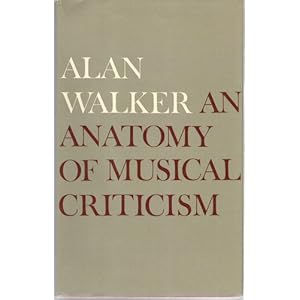absinthe wrote:Theory of musical criticism?
Jesus, they'll be doing degree courses on it next. What the heck does a critic think he can do? Useful I mean?
Do you believe that informed, intelligent, and purposeful discussion of music is useless? If so, then what are we doing here? Not all those who review performances and recordings measure up, but that's only the journalistic aspect of criticism.
Alan Walker is not a musical journalist, as the bio in Wikipedia shows. (
http://en.wikipedia.org/wiki/Alan_Walker_(musicologist)) He is a university professor, a musicologist, and the author of a 3-volume biography of Liszt and recently a biography of Hans von Bülow. I'm sure his views on musical criticism are cogent and worth reading. Thanks, IcedNote!
Joseph Kerman, author of one of the most influential works of musical criticism, "Opera as Drama," discusses that discipline in "Contemplating Music: Challenges to Musicology." (Musicology is one of many forms of musical study that can provide a foundation for serious criticism.) Here's a much abridged version of what he says in the Introduction:
Joseph Kerman wrote:Criticism - the study of the meaning and value of art works - does not figure in the explicit programs of musicology or theory. In music-academic circles, the term "criticism" is little used. It is, in fact, positively distrusted. Part of the problem is the vexing common usage of the term "criticism" to mean the reviewing of concerts for daily or weekly papers - that and nothing more. Journalistic criticism has a very bad odor in the profession. The folklore of journalism is rich in rascally tales of music critics who switched over one fine day from the sports pages to revel in a life of ignorance and spite. What I would call serious music criticism does not exist as a discipline on a par with musicology and music theory on the one hand, or literary and art criticism on the other. We do not have musical Arnolds or Eliots, Blackmuirs or Kermodes, Ruskins or Schapiros.
But we do have Kerman, Charles Rosen, and not a few others in and out of the academy, who may not work within a defined theory of what music criticism is or should be, but who do music criticism anyway, and on a high level of complexity and sophistication.
"Contemplating Music" is, as its subtitle says, about musicology, which is scholarly research and study, usually academic. However, it includes a chapter, "Musicology and Criticism," which goes further into what musical criticism is or ought to be. Because of its academic orientation, you may not find it as engrossing as Alan Walker's book, but who knows? If the subject interests you, these 40+ pages may open up the discipline of musical criticism in many ways - none of them having the slightest connection with the reviews in the New York Times and Fanfare.


